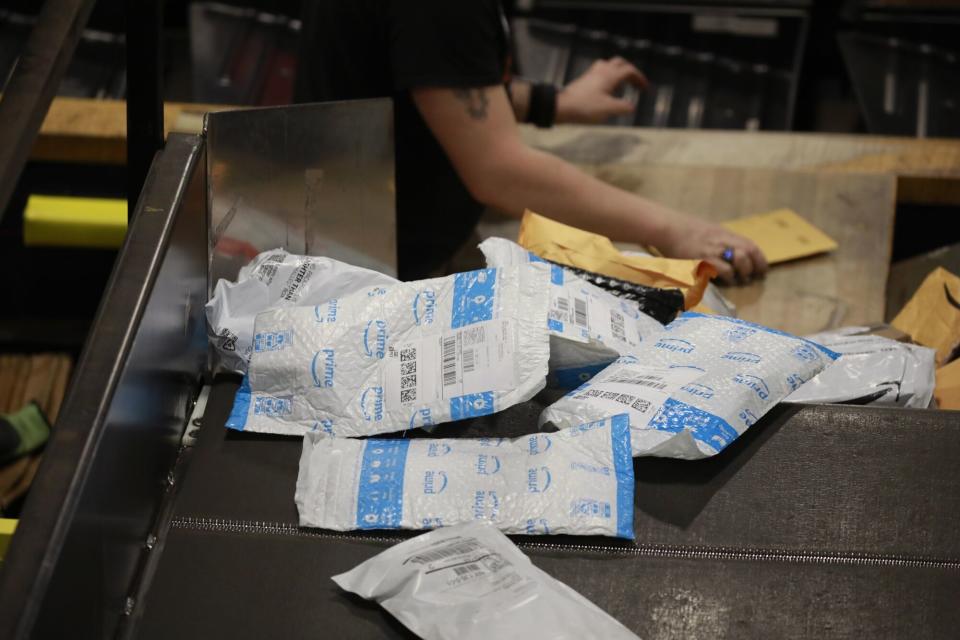Amazon Is Ditching Plastic Air Pillow Packaging in North America
(Bloomberg) -- Amazon.com Inc., seeking to become more environmentally friendly, is replacing plastic air pillows in its North American shipments with recycled paper.
Most Read from Bloomberg
Nvidia Rout Takes Breather as Traders Scour Charts for Support
BuzzFeed Struggles to Sell Owner of Hit YouTube Show ‘Hot Ones’
Jain Global Raises $5.3 Billion, Secures Cash From Abu Dhabi
How Long Can High Rates Last? Bond Markets Say Maybe Forever
Wikileaks’ Julian Assange to Plead Guilty, Ending Yearslong US Battle
The e-commerce giant says it has already eliminated some 95% of the thin plastic cushions in its largest market and anticipates removing the rest by year-end. It’s among Amazon’s biggest moves to date to stop dispatching packages with single-use plastic that, while technically recyclable in specialty facilities, more often winds up in landfills or clogging machinery in recycling centers not designed for thin film.
The next step: replacing the similarly hard-to-recycle white and blue plastic mailers with paper sleeves, said Pat Lindner, an Amazon vice president who oversees the company’s sustainable packaging initiatives. “We’re now at the stage where we’re pretty confident that we’re going to be able to scale that in the coming months,” he said. “We’re pleased with the progress we’ve made.”
Amazon has ramped up its plastic-reduction efforts following criticism from environmental watchdogs who said the company was contributing to the tide of plastic waste finding its way into the world’s oceans. At Amazon’s annual shareholders’ meeting in 2022, almost half of Amazon investors backed a proposal recommending that the company outline steps to reduce plastic use.
Amazon disclosed a detailed figure on a portion of its plastic use for the first time later that year, though it has stopped short of setting a public goal to entirely eliminate plastic from its operations. Amazon says it used 85,916 metric tons of single-use plastic in shipments worldwide in 2022, down 12% from the prior year.
“We, a couple years ago, really decided based on all the customer input that reducing the amount of plastics packaging was important to have on our road map,” Lindner said.
Amazon said it stopped using most plastic packaging in Europe by late 2022. Last year, the company retrofitted a warehouse in Ohio to ship products without any added plastic, using custom paper mailers and machines capable of building made-to-fit cardboard boxes around individual products. Those materials and machines added to Amazon’s costs, compared with its prior plastic-based infrastructure, Lindner said. But that was partly offset by increased automation that required less manual labor in areas of the warehouse where employees pack items in boxes.
The paper filler is likewise more expensive than the plastic air pillows, though Lindner said ditching the machines that dispensed the pillows in favor of simpler tissue-box like paper dispensers should lower Amazon’s maintenance costs.
Before rolling out the paper filler, which is designed to be recyclable in curbside bins, Amazon tested the material to make sure it protected the products it was wrapped around. By many measures, paper performed better.
Clint Haynes, a vice president with Stress Engineering Services, which Amazon paid to carry out tests, likened paper wrapping to the crumple zone in cars that absorb the shock of collisions. The pillows, on the other hand, act as tiny trampolines when jostled in a truck rattling down a bumpy road, further bouncing the products they’re meant to protect.
Plus when they’re pushed to the limit, pillows pop. Paper holds its shape. “That’s a really nice attribute,” Haynes said. “I get more than one big whack.”
Listen on Zero: Why the Plastic Problem Needs a Legally Binding Global Treaty
Most Read from Bloomberg Businessweek
How Jeff Yass Became One of the Most Influential Billionaires in the 2024 Election
Why BYD’s Wang Chuanfu Could Be China’s Version of Henry Ford
Independence Without Accountability: The Fed’s Great Inflation Fail
©2024 Bloomberg L.P.

 Yahoo Finance
Yahoo Finance 

